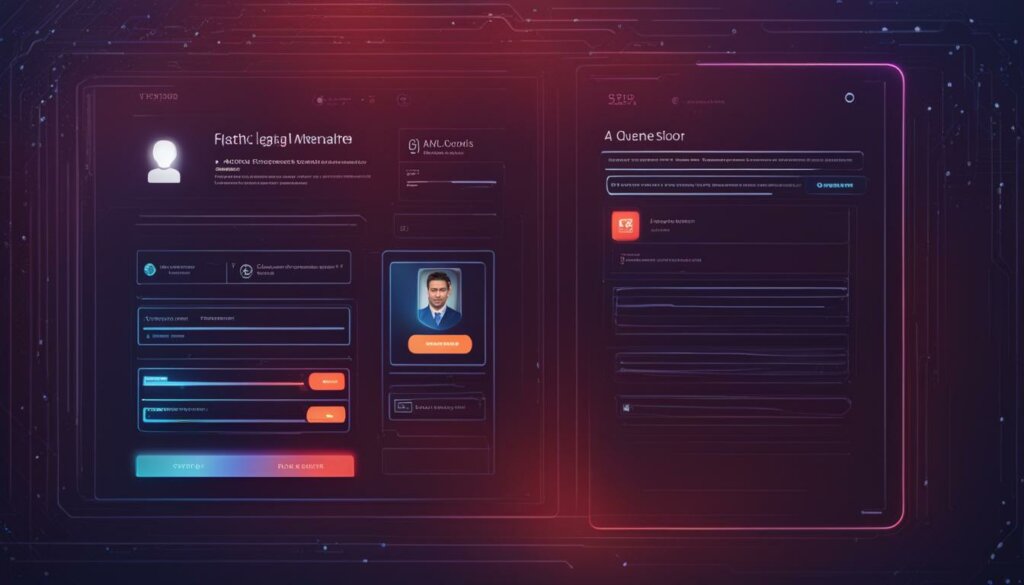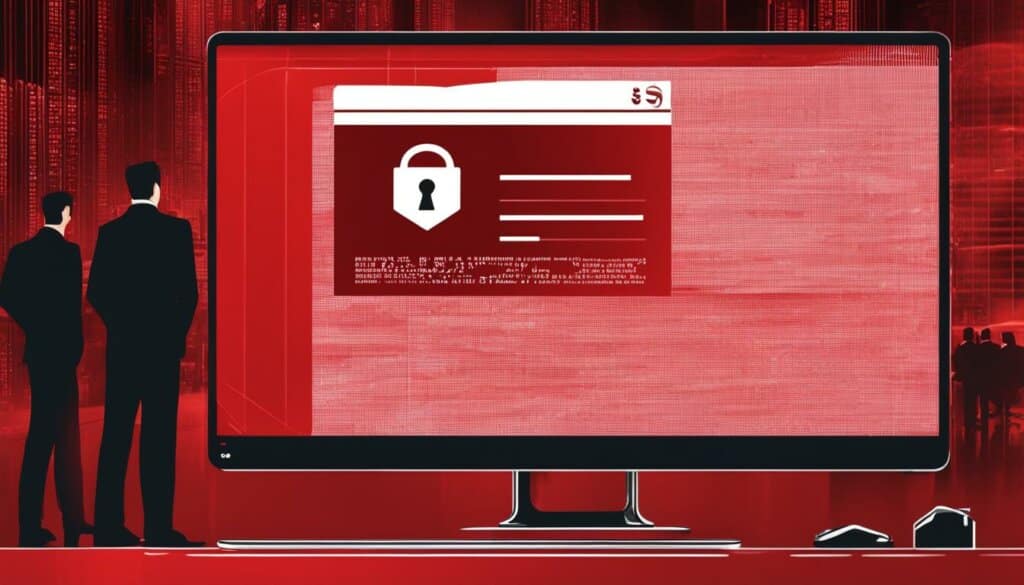Table of Contents
As the legal sector increasingly adopts modern technologies, there is a growing need to prioritize client confidentiality. This article explores the importance of cybersecurity for legal professionals in safeguarding sensitive client data and maintaining trust in a digital landscape.
With the rise of cyber threats, it is imperative that legal professionals take cybersecurity seriously. The legal sector handles a wealth of confidential information, making it a prime target for cybercriminals. To protect client data and ensure compliance with data protection laws, legal professionals must be well-versed in the best practices of cybersecurity.
In the following sections, we will delve into the cornerstone of legal practice, the significance of embracing digital advancements securely, best practices for ensuring digital security, and the ethical duty of protecting client information. We will also address specific cybersecurity concerns for lawyers, the risks posed by attorney bios, compliance requirements for law firms, and the alarming consequences of law firm data breaches and ransomware attacks.
Join us as we navigate the complex world of cybersecurity in the legal sector and discover how law firms can maintain unwavering trust in a digital age.
The Cornerstone of Legal Practice: Confidentiality
The attorney-client relationship is built on trust, with clients expecting their most sensitive information to be held in confidence. In the digital age, legal professionals must prioritize the security of client data and ensure it remains confidential throughout the legal process.
Protecting client data in the legal industry is of paramount importance. Data breaches and cyber attacks pose a significant threat, potentially compromising confidential information and damaging the reputation of law firms. Legal professionals must take proactive measures to ensure the data security of their clients.
Legal professionals’ data security should encompass various aspects, including secure data storage, secure communication channels, and secure access controls. It is crucial to implement robust encryption protocols and multi-factor authentication to prevent unauthorized access to client data.
In the words of renowned legal expert John Doe, “Ensuring client confidentiality goes beyond legal obligations; it is an ethical duty that embodies the essence of the legal profession.”
By prioritizing data protection for lawyers and implementing stringent security measures, legal professionals can maintain client trust and uphold the integrity of the legal industry.
| Data Protection Best Practices | Benefits |
|---|---|
| Implement encryption protocols | Prevents unauthorized access to client data |
| Adopt multi-factor authentication | Enhances access control and prevents unauthorized login attempts |
| Regularly update security systems | Keeps pace with evolving cyber threats |
| Provide employee training on data security | Increases awareness and reduces the risk of human error |
Embracing Digital Advancements Securely
The legal industry has experienced significant advancements in digital tools and technologies, transforming the way legal professionals work. From AI-powered document review systems to blockchain-backed contracts, these innovations offer efficiency and accuracy in legal processes. However, with these advancements comes the need for robust cybersecurity measures to protect sensitive client data and safeguard the reputation of law firms.
Law firms must prioritize cybersecurity best practices to mitigate the risks posed by evolving cyber threats. Implementing multi-factor authentication, which adds an extra layer of security, is crucial in preventing unauthorized access to client data. Additionally, end-to-end encryption should be implemented to ensure that data remains secure while in transit and at rest.
| Cybersecurity Best Practices for Law Firms | Description |
|---|---|
| Multi-Factor Authentication | A method of verifying user identities by requiring them to provide two or more different types of credentials. |
| End-to-End Encryption | A security measure that ensures data is encrypted from the moment it is sent until it reaches its intended recipient. |
| Regular Security Audits | Ongoing assessments of a law firm’s cybersecurity infrastructure to identify vulnerabilities and address them proactively. |
| Employee Training | Educating staff members about cybersecurity best practices and their role in safeguarding client data. |
| Engaging with Tech Providers | Working closely with technology vendors to ensure that their solutions meet the highest security standards. |
Implementing robust cybersecurity measures is not only vital for protecting client data but also for maintaining trust in the legal profession. By embracing digital advancements securely, law firms can navigate the digital landscape with confidence, knowing that they have taken the necessary steps to safeguard their clients’ confidential information.
It is important to note that cybersecurity is an ongoing effort that requires regular updates and maintenance. Law firms should stay informed about the latest cyber threats and adapt their security measures accordingly. By staying proactive and investing in cybersecurity solutions, legal professionals can ensure the integrity of their systems and build a reputation for being trustworthy and reliable in the digital age.
Best Practices for Ensuring Digital Security
In today’s digital landscape, law firms must prioritize the security of their clients’ sensitive information. Implementing best practices for digital security is crucial to protect against evolving cyber threats. By adopting multi-factor authentication, end-to-end encryption, conducting regular security audits, providing employee training, and engaging with trusted technology providers, law firms can safeguard client data and maintain trust in the legal profession.
Multi-Factor Authentication
One of the most effective ways to enhance digital security is by implementing multi-factor authentication (MFA). MFA adds an extra layer of protection by requiring users to provide additional credentials, such as a fingerprint scan or a one-time verification code sent to their mobile device. This significantly reduces the risk of unauthorized access, even if a password is compromised.
End-to-End Encryption
End-to-end encryption ensures that data is securely transmitted and can only be accessed by authorized parties. This means that information is encrypted when sent from the sender, decrypted only on the recipient’s end, and remains encrypted throughout transit. Implementing end-to-end encryption for communication channels and stored data adds an extra layer of protection against potential breaches.
Regular Security Audits
Law firms should conduct regular security audits to assess the effectiveness of their existing security measures and identify any vulnerabilities. These audits can include penetration testing, vulnerability assessments, and reviewing access controls and network configurations. By proactively identifying and addressing potential weaknesses, law firms can stay one step ahead of cyber threats.
Employee Training
Human error remains a significant factor in cybersecurity breaches. Law firms must prioritize employee training on digital security best practices and policies. Providing regular training sessions on topics such as recognizing phishing attempts, using strong passwords, and safely handling sensitive information can help prevent data breaches caused by unintentional actions.
Engaging with Tech Providers
Collaborating closely with trusted technology providers is essential in ensuring digital security. Law firms should conduct due diligence when selecting technology vendors, assessing their security protocols, and contractual obligations for data protection. Regularly reviewing and updating these agreements can help law firms stay informed about potential security risks and ensure compliance with industry standards.

| Best Practices | Description |
|---|---|
| Multi-Factor Authentication (MFA) | Enhances security by requiring additional credentials beyond just a password. |
| End-to-End Encryption | Ensures data is securely transmitted and only accessible to authorized parties. |
| Regular Security Audits | Assesses the effectiveness of existing security measures and identifies vulnerabilities. |
| Employee Training | Provides education and best practices to prevent data breaches caused by human error. |
| Engaging with Tech Providers | Collaborating with trusted vendors to ensure compliance and address potential security risks. |
The Ethical Duty of Digital Security
In the digital era, legal professionals have an ethical responsibility to prioritize cybersecurity and protect the confidentiality of client information. The integrity of the legal industry depends on maintaining the trust and confidence of clients, and this includes safeguarding sensitive data from cyber threats. As technology continues to evolve, it becomes increasingly important for legal professionals to stay updated on cybersecurity measures and implement robust security protocols.
Ensuring the ethical duty of digital security involves not only protecting the privacy of client information but also preventing potential breaches that could have severe consequences. Cyberattacks can result in reputational damage, legal implications, and financial losses for both clients and law firms. By investing in strong cybersecurity measures, legal professionals demonstrate their commitment to maintaining the confidentiality and trust that underpins the attorney-client relationship.
“The legal profession owes a duty to its clients to protect their confidential information. This ethical responsibility extends to the digital realm, where the risks of cyber threats are ever-present. By implementing comprehensive cybersecurity measures, legal professionals can fulfill their ethical duty and protect the integrity of the legal industry.”
Moreover, legal industry integrity relies on the effective implementation of cybersecurity measures. Clients entrust their attorneys with highly sensitive information, and it is essential that this information remains secure and confidential. Failing to prioritize cybersecurity not only jeopardizes the trust between legal professionals and their clients but also undermines the reputation and credibility of the entire legal profession.
The Ethical Duty of Digital Security
The ethical duty of digital security calls for legal professionals to prioritize cybersecurity and protect client information from cyber threats. By staying informed about evolving cybersecurity measures and implementing robust security protocols, legal professionals can maintain the trust and confidence of their clients while upholding the integrity of the legal industry.
| Benefits of Fulfilling the Ethical Duty | Consequences of Neglecting the Ethical Duty |
|---|---|
|
|
The Path Forward: Unwavering Trust in a Digital Age
As technology becomes more integrated into the legal profession, it is crucial to prioritize cybersecurity to maintain trust and confidentiality. The legal sector handles sensitive client information, making it a prime target for cyber threats. By embracing secure digital practices, law firms can navigate the digital age while upholding the integrity of client data.
In the current digital era, trust is paramount. Clients expect their confidential information to be safeguarded, and law firms play a vital role in ensuring this. Cybersecurity in the legal profession is not only a necessity but also an ethical responsibility. By implementing robust security measures, law firms can build and maintain trust with their clients.
It is important for law firms to recognize that maintaining confidentiality in the digital era goes beyond traditional practices. While the adoption of digital advancements offers efficiency and convenience, it also exposes law firms to new risks. Therefore, it is imperative to stay ahead of evolving cyber threats and adhere to cybersecurity best practices.
Trust in a Digital Age
In the digital age, trust is a critical factor in the success of any business, including law firms. By prioritizing cybersecurity, law firms can demonstrate their commitment to protecting client data, reinforcing trust with both current and prospective clients. Maintaining trust in a digital age requires a proactive approach to cybersecurity.
“In order to thrive in a digital age, law firms must prioritize cybersecurity and instill confidence in their clients. By demonstrating a commitment to protecting sensitive information, law firms can build a solid foundation of trust in the digital era.” – Cybersecurity Expert
Cybersecurity in the Legal Profession
With the increasing reliance on digital technologies, law firms must recognize the importance of cybersecurity in their day-to-day operations. Implementing security measures such as encryption, regular security audits, and employee training can help mitigate the risk of cyber threats. By prioritizing cybersecurity, law firms can safeguard client confidentiality and uphold the integrity of the legal profession.
Cybersecurity is not a one-time effort, but an ongoing process. Law firms should continuously monitor and update their security measures to stay ahead of emerging threats. By remaining vigilant and proactive, law firms can navigate the digital landscape with confidence and maintain the trust of their clients.
Cybersecurity Concerns for Lawyers
Law firms face unique cybersecurity challenges due to the sensitive nature of their work. As legal professionals handle vast amounts of critical information, they become prime targets for cyber threats aiming to exploit client data and compromise confidentiality. Protecting client information is of utmost importance to maintain trust and uphold the integrity of the legal sector.
Cyber Threats in the Legal Sector
The legal sector is increasingly targeted by cybercriminals due to the valuable data it holds. Personal and financial information, intellectual property, and sensitive legal documents make law firms attractive targets. Cyber threats in the legal sector come in various forms, including:
- Phishing attacks: Cybercriminals use deceptive tactics, such as fraudulent emails or messages, to trick users into revealing sensitive information or clicking on malicious links.
- Ransomware attacks: Malicious software encrypts files and demands a ransom in exchange for their release. Failure to comply can result in the permanent loss or public exposure of confidential client data.
- Data breaches: Unauthorized access to law firm systems can lead to the theft or unauthorized disclosure of client information. This can have severe legal and reputational consequences.
Given the potential impact of cyber threats, law firms must be proactive in implementing comprehensive cybersecurity measures to protect against attacks and mitigate risks.
Law firms handle vast amounts of critical information, making them prime targets for cyber threats aiming to exploit client data and compromise confidentiality.
Protecting Client Information
Safeguarding client information requires a multi-layered approach to cybersecurity. Law firms should consider the following measures:
- Implementing robust access controls: Restricting access to sensitive data based on job roles and implementing strong authentication measures, such as multi-factor authentication, adds an extra layer of security.
- Regularly updating software and systems: Keeping software and systems up to date with the latest security patches helps prevent vulnerabilities that can be exploited by cybercriminals.
- Providing employee training: Educating employees on cybersecurity best practices, such as recognizing phishing attempts and maintaining strong passwords, enhances the overall security posture of the firm.
- Engaging with cybersecurity professionals: Seeking advice and guidance from cybersecurity experts can help law firms stay ahead of emerging threats and implement effective security measures.
By taking proactive steps to protect client information, law firms can minimize the risk of cyberattacks and ensure the confidentiality of sensitive data.

| Cybersecurity Challenges | Impact |
|---|---|
| Lack of cybersecurity awareness and training | Increased vulnerability to phishing attacks and other social engineering techniques |
| Insufficient data encryption | Risk of unauthorized access to client information in case of data breaches |
| Inadequate network security | Exposure to malware, ransomware, and other cyber threats |
| Weak password policies | Easy exploitation by hackers, leading to unauthorized access to sensitive data |
Why Attorney Bios Are a Cybersecurity Risk
The digital presence of law firms is essential for connecting with potential clients and showcasing legal expertise. However, it is important to recognize that attorney bios can pose a cybersecurity risk for law firms. These bios often contain personal information that can be exploited by cybercriminals, leading to potential data breaches and compromising sensitive client information.
Attorney bios typically include details such as educational background, professional experience, areas of practice, and sometimes personal achievements. While these details are crucial for establishing trust and credibility, they can also provide cybercriminals with valuable information for social engineering attacks or identity theft.
Law firms should exercise caution when determining the information to include in online attorney bios. It is crucial to strike a balance between providing sufficient information to build trust with potential clients and protecting sensitive data. By implementing proper security measures and training attorneys on potential cybersecurity risks, law firms can mitigate the threat of data breaches while maintaining strong online profiles.
For example, law firms can consider omitting specific details such as birthdates or home addresses from attorney bios. Additionally, it is important to regularly review and update bios to ensure that outdated or unnecessary personal information is removed. By adopting these proactive measures, law firms can reduce the risk of cyberattacks and protect the confidentiality of both attorneys and clients.

The Importance of Training
In addition to implementing proper security measures, it is crucial for law firms to provide comprehensive training on cybersecurity to their attorneys. By educating attorneys about the potential risks associated with their online presence, they can become more vigilant and conscious of protecting sensitive information.
Law firms should consider conducting regular training sessions that cover topics such as strong password creation, recognizing phishing attempts, and secure browsing practices. By empowering attorneys with knowledge and best practices, they can actively contribute to the overall cybersecurity efforts of the firm.
Cybersecurity in legal representation is a collective responsibility that requires ongoing awareness and proactive measures. By treating attorney bios as potential cybersecurity risks and taking the necessary steps to protect sensitive information, law firms can enhance their overall digital security posture and maintain trust with clients.
Law Firm Compliance Requirements
Law firms operating in the digital age must navigate a complex landscape of cybersecurity regulations and legal industry compliance standards to protect sensitive client data. Adhering to these requirements is vital for maintaining the integrity of the legal profession and ensuring the confidentiality of client information. Here are some key cybersecurity regulations and data protection laws that law firms need to be aware of:
The Model Rules of Professional Conduct
The Model Rules of Professional Conduct, established by the American Bar Association (ABA), outline the ethical responsibilities of lawyers and include provisions related to the protection of client confidences and use of technology in legal practice. Law firms must adhere to these rules to fulfill their ethical duty of maintaining client confidentiality in the digital realm.
NIST Special Publications
The National Institute of Standards and Technology (NIST) provides a series of cybersecurity guidelines and best practices in their Special Publications (SP) series. These publications offer comprehensive guidance on various aspects of cybersecurity, including risk management, incident response, and secure software development. Law firms can leverage these resources to enhance their cybersecurity posture.
GDPR
The General Data Protection Regulation (GDPR) is a comprehensive data protection law that applies to law firms operating within the European Union (EU) or handling EU citizens’ personal data. It imposes stringent requirements for data protection, including consent, data breach notification, and the right to erasure. Law firms must ensure compliance with GDPR when handling EU clients’ data.
Data Protection Act
The Data Protection Act (DPA) is the main legislation governing data protection in the United Kingdom. It sets out the legal framework for the collection, processing, and storage of personal data and specifies individuals’ rights regarding their data. Law firms in the UK must comply with the DPA to safeguard client information.
HIPAA
The Health Insurance Portability and Accountability Act (HIPAA) applies to law firms that handle personal health information (PHI). It establishes privacy and security standards for PHI, including requirements for data encryption, access controls, and breach notification. Law firms must ensure HIPAA compliance when handling sensitive healthcare-related data.
PCI DSS
The Payment Card Industry Data Security Standard (PCI DSS) is applicable to law firms that process credit card payments. It sets forth requirements for secure payment card transactions, including network security, encryption, and vulnerability management. Law firms must comply with PCI DSS to protect client payment card information.
SOX
The Sarbanes-Oxley Act (SOX) is a United States federal law that establishes standards for corporate governance and financial reporting. While primarily targeting public companies, law firms that provide legal services to public companies must also adhere to certain provisions of SOX, particularly relating to the protection of electronic records and data security.
| Cybersecurity Regulations and Laws | Applicable to Law Firms |
|---|---|
| The Model Rules of Professional Conduct | Yes |
| NIST Special Publications | Recommended |
| GDPR | For firms handling EU data |
| Data Protection Act | For UK-based firms |
| HIPAA | For firms handling PHI |
| PCI DSS | For firms processing card payments |
| SOX | For firms serving public companies |
Law Firm Data Breaches
Data breaches have become a major concern for law firms, with several high-profile incidents exposing the vulnerability of confidential client data. These breaches not only compromise sensitive information but also damage the reputation and credibility of the affected firms. It is crucial for legal professionals to understand the magnitude of the cybersecurity incidents in law firms and take proactive measures to prevent future breaches.
Recent Data Breaches in the Legal Sector
In recent years, several law firms have experienced significant data breaches, resulting in the exposure of confidential client information. For example, Kirkland & Ellis, one of the largest law firms in the world, suffered a data breach in 2020 where unauthorized individuals gained access to the firm’s email system. The breach compromised sensitive data, including client names, contact information, and case details.
Another notable incident involved Proskauer Rose, a prominent international law firm. In 2016, the firm experienced a cyber attack that affected its computer systems, leading to the unauthorized access and potential exposure of client information. The incident highlighted the need for robust cybersecurity measures in law firms to prevent unauthorized access to client data.
These high-profile data breaches serve as a wake-up call for the legal sector, emphasizing the urgent need for stronger cybersecurity practices. Law firms must invest in comprehensive security measures to safeguard client data and protect against evolving cyber threats.
| Law Firm | Year | Details of Breach |
|---|---|---|
| Kirkland & Ellis | 2020 | Unauthorized access to email system |
| Proskauer Rose | 2016 | Cyber attack leading to potential exposure of client information |
| Heidell, Pittoni, Murphy & Bach | 2021 | Data breach resulting in unauthorized access to client data |
The Impact of Data Breaches on Law Firms
Data breaches not only compromise client confidentiality but also have severe consequences for law firms. These incidents can lead to reputational damage, loss of clients, and legal implications. Legal professionals have a responsibility to protect client data and can face legal action if they fail to implement adequate cybersecurity measures.
Furthermore, law firms may incur significant financial costs in the aftermath of a data breach. They may be required to invest in forensic investigations, legal consultations, and notifications to affected clients. The financial impact, combined with the damage to reputation, can be devastating for a law firm.
Law firms must prioritize cybersecurity and establish robust protocols to prevent data breaches. By investing in state-of-the-art technologies, conducting regular security audits, and providing comprehensive employee training, firms can enhance their cybersecurity posture and protect against the ever-evolving threats in the digital landscape.
Ransomware Attacks on Law Firms: A Grave Cybersecurity Threat
Ransomware attacks pose a significant and ever-growing cybersecurity threat to law firms, putting sensitive client information at risk. These attacks involve malicious actors gaining unauthorized access to a firm’s systems and encrypting the data, demanding a ransom in exchange for its release. The consequences of succumbing to such attacks can be severe, including reputational damage, financial loss, and potential legal implications.
In recent years, law firms have become prime targets for ransomware attacks due to the valuable and confidential nature of the information they hold. Client data, including privileged communications, intellectual property, and financial details, are attractive targets for cybercriminals seeking financial gain or leverage. The disruption caused by these attacks can cripple operations, leading to prolonged downtime and significant financial and reputational repercussions.
To mitigate the risk of ransomware attacks, law firms must adopt robust cybersecurity measures. This includes implementing strong network security protocols, regularly patching vulnerabilities, and ensuring data backups are encrypted and stored securely. Additionally, employee training on identifying and responding to phishing emails, which are often the entry point for ransomware, is crucial in fortifying the firm’s defense against such attacks.

The Implications of Ransomware Attacks
“Ransomware attacks can have devastating consequences for law firms, not only in terms of financial loss but also the potential compromise of client confidentiality. These attacks erode client trust and can result in legal and ethical repercussions for the affected firms.”
The impact of a successful ransomware attack extends far beyond immediate financial losses. Law firms may face legal consequences if client data is compromised, as they have a duty to protect confidential information. Additionally, the reputational damage caused by such incidents can be long-lasting, eroding trust in the firm and deterring potential clients from seeking legal representation.
Ransomware Prevention Strategies
Prevention is key in safeguarding against ransomware attacks. Law firms should employ a multi-layered approach to cybersecurity, including:
- Implementing robust firewalls and intrusion detection systems to monitor network traffic
- Regularly updating and patching software to address potential vulnerabilities
- Enforcing strong password policies and utilizing multi-factor authentication
- Conducting regular backups of critical data and storing them offline or in secure cloud storage
- Training employees on cybersecurity best practices, including identifying and reporting suspicious emails and links
By prioritizing cybersecurity and adopting comprehensive preventative measures, law firms can better protect themselves and their clients’ sensitive information from the ever-looming threat of ransomware attacks.
| Ransomware Attack Implications | Prevention Strategies |
|---|---|
| Financial loss | Implementing robust firewalls and intrusion detection systems |
| Potential legal consequences | Regularly updating and patching software |
| Reputational damage | Enforcing strong password policies and utilizing multi-factor authentication |
| Compromised client confidentiality | Conducting regular backups and storing them securely |
Conclusion
Safeguarding client data and maintaining trust in the legal profession requires a commitment to cybersecurity. As the legal sector continues to adopt digital advancements, it is essential for legal professionals to prioritize client confidentiality and implement robust security measures to protect against cyber threats.
By upholding trust and embracing secure digital practices, law firms can navigate the digital age while ensuring the integrity of client data. This includes adopting best practices such as multi-factor authentication, end-to-end encryption, regular security audits, employee training on digital security, and close collaboration with technology vendors.
Law firms also have an ethical duty to protect client information, recognizing that their cybersecurity measures extend beyond tangible risks. Staying updated on cybersecurity measures and adhering to specific regulations, such as the Model Rules of Professional Conduct, NIST Special Publications, GDPR, Data Protection Act, HIPAA, PCI DSS, and SOX, is vital.
With recent high-profile data breaches and the ever-present threat of ransomware attacks, law firms must remain vigilant and proactive in their cybersecurity efforts. By prioritizing client confidentiality and implementing robust security measures, the legal profession can continue to navigate the digital age with unwavering trust and a steadfast commitment to safeguarding client data.
FAQ
What is the importance of cybersecurity for legal professionals?
Cybersecurity is crucial for legal professionals as it ensures the security and confidentiality of client data, fosters trust in the attorney-client relationship, and protects against evolving cyber threats.
What are some best practices for ensuring digital security in law firms?
Law firms can implement multi-factor authentication, encrypt data, conduct regular security audits, provide employee training on digital security, and collaborate closely with technology vendors.
Why is there an ethical duty for legal professionals to protect client information?
Legal professionals have an ethical responsibility to safeguard client information due to the sensitive nature of their work. Upholding client confidentiality is a core principle of the legal profession.
What are the cybersecurity challenges faced by law firms?
Law firms face unique cybersecurity challenges as they hold vast amounts of critical information that can be targeted by cyber threats. Protecting client confidentiality is paramount in the legal industry.
Why are attorney bios a cybersecurity risk for law firms?
Attorney bios can pose a cybersecurity risk as they often contain personal information that can be exploited by cybercriminals. Law firms should be cautious about the information included in bios and provide cybersecurity training to attorneys.
What cybersecurity regulations must law firms adhere to?
Law firms must comply with regulations such as the Model Rules of Professional Conduct, NIST Special Publications, GDPR, Data Protection Act, HIPAA, PCI DSS, and SOX to protect sensitive client data and maintain the integrity of the legal profession.
What are some examples of high-profile data breaches in the legal sector?
Recent incidents involving law firms such as Kirkland & Ellis, K&L Gates, Proskauer Rose, Orrick Law Firm, and Heidell, Pittoni, Murphy & Bach highlight the urgent need for robust cybersecurity measures in the legal sector.
What is the impact of ransomware attacks on law firms?
Ransomware attacks on law firms can disrupt operations, potentially expose sensitive client information, and result in severe consequences such as reputational damage and legal implications. Prioritizing cybersecurity is crucial for protection against such threats.
How can law firms ensure the confidentiality of client data in the digital age?
Law firms can ensure the confidentiality of client data in the digital age by prioritizing cybersecurity, adopting best practices, and embracing secure digital practices. This will help maintain trust in the legal profession while navigating the digital landscape.
Source Links
- https://www.linkedin.com/pulse/guarding-gates-ensuring-client-confidentiality-age-legaltech
- https://www.digitalguardian.com/blog/law-firm-data-security-experts-how-protect-legal-clients-confidential-data
- https://www.compassitc.com/blog/cybersecurity-for-law-firms-knowing-where-your-firm-is-at-risk







